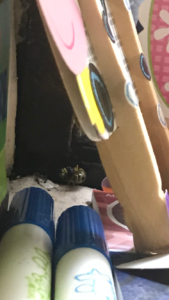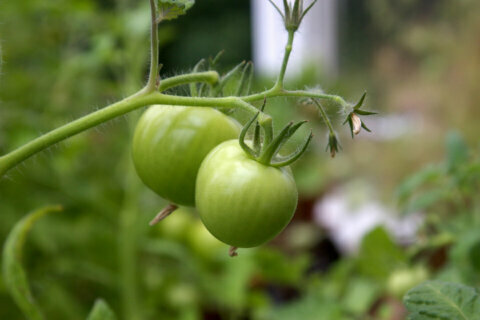Slippery walkway ‘algae’ folds under pressure
Judy in D.C. writes: “After 8 days of rain my brick patio, slate sidewalk and wooden deck have been taken over by extremely slick ‘algae.’ What’s the safest way to clean them?”
I suggest plain old water in a pressure washer.
Mold, mildew, moss and the other unwanted creatures of damp shady spots are pretty easy to physically dislodge, especially if you get to them right away.
However, my place got just as much rain and I returned to no “algae,” so see if you can prune to help get some more sunlight and airflow to those areas.
Bill has a hornet’s nest IN his house

Bill in Bethesda writes: “Two very large bees or wasps have entered our basement in one week, possibly through the fireplace they were near when spotted. They scared my two young children and we’re a little concerned there are more. I thought wasps don’t appear until late summer.”
No, Bill — creatures like paper wasps and mud daubers are VERY active now building their nests under eaves, behind shutters, inside outdoor light fixtures and similar spots.
Both of those wasps are black but the photo you sent showed a more colorful bee-like creature, probably a hornet — and yes, that means there may be hornets building a nest somewhere in your fireplace.
Unfortunately, all wasps and hornets can deliver a pretty nasty sting.
Luckily, the most obvious location of your new tenants suggests a simple solution. I would smoke them out with a slow, long fire that includes some fresh uncured wood.
Smoke is more important here than heat.
Important note: Ground nesting native bees that are also active now are harmless pollinators that have no stingers — so please let them “bee.”
Only one mulch can protect your tomatoes
Ed in Takoma Park wins this week’s terseness award with an email simply labeled “tomatoes” and the message “why mulch with compost only?”
Ed is referring to advice I gave in a Garden Plot a few weeks back.
Because tomatoes — and their fellow drama queens, roses and lilacs — are very prone to fungal infections that begin at the soil surface when sickly spores blow in, especially after the kind of prolonged wet weather we just endured.
Any kind of wood-based mulch creates the perfect conditions for these fungi to multiply as rapidly as possible.
Straw and shredded leaves are benign — they neither spread nor stop disease.
But high-quality yard waste compost, NOT composted manure, actually inhibits the growth of fungal organisms and protects the plants.
Maryland’s Leaf-Gro is a fine example of the kind of compost you want.
Personal fireworks wipe out weeds that pop their seeds
Ed in Alexandria writes: “There’s a weed in our lawn that my wife and I call ‘poppers.’ It has a central stalk that towers over the lawn with tiny white flowers that turn into thin seed pods reaching for the sky. If we don’t get them early, the seed pods will mature and *pop!* if you touch them, sending tiny seeds everywhere! Is there a way to get rid of them before they take over the lawn?”
Yes, Ed — get yourself a flame weeder, a small propane-powered garden device that can be used to easily wilt the flowers of weeds like this before they can set seed. I use this flame weeder.
Or wait until the seed pods form and then torch them — they explode like Munchkin fireworks! Same with dandelions, except the colors are prettier when those puffballs go up. And yes, I am easily amused.
Correct lawn care prevents weeds
In our last thrilling episode, we told Ed in Alexandria to use a flame weeder to torch the tops of his “poppers.” But the presence of this weed in turf is a sure sign of improper lawn care.
It’s generally found only in wild, weedy areas.
Only correct care can prevent such weeds from appearing in the first place. Or the future. Your choice.
Anyway — your grass should never be lower than three inches after being cut. Ideally, wait until the grass reaches four inches high and then cut an inch off the top with a super-sharp blade. Never use a dull blade and never cut wet grass.
Cutting lower than this invites weeds to move in.
Strategically withhold water to make the grass grow the long deep roots that make it impossible for weeds to establish a foothold.
That means no added water in any week when we have an inch of rain. If and when we go a week without, water deeply once. That means for several hours, ending just as the morning sun hits the grass.
Never water more frequently than weekly.
Never water in the heat of the day.
Never water in the evening.
When in doubt, don’t water.
Mike McGrath was Editor-in-Chief of ORGANIC GARDENING magazine from 1990 through 1997. He has been the host of the nationally syndicated Public Radio show “You Bet Your Garden” since 1998 and Garden Editor for WTOP since 1999. Send him your garden or pest control questions at MikeMcG@PTD.net.






